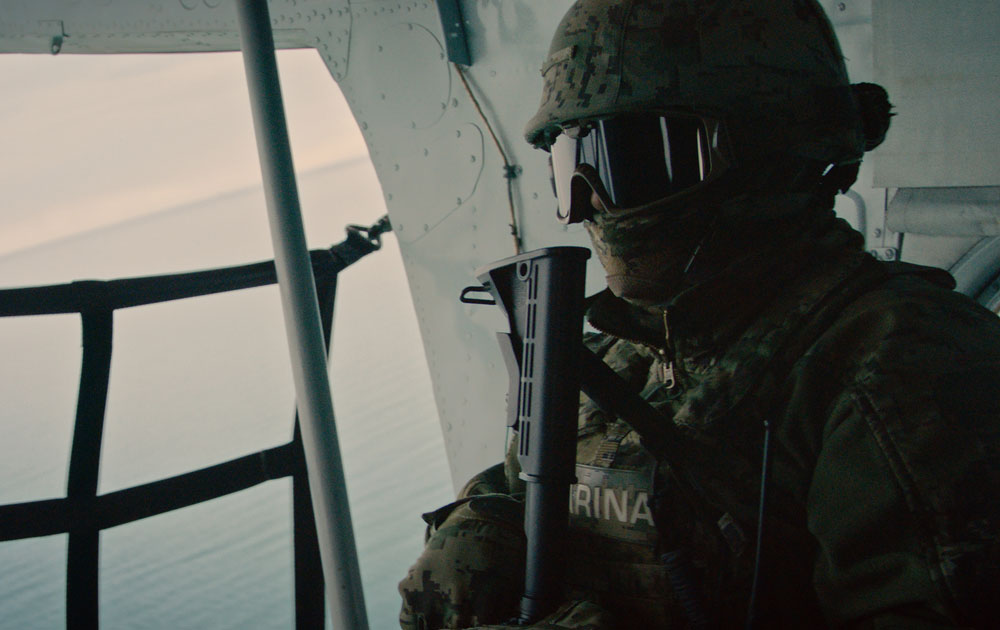One of the less commented upon aspects of the current documentary boom is the way in which new technology has leveled the playing field stylistically between nonfiction and big Hollywood productions. Drones have made it just as likely to see a sweeping establishing shot now in a doc as a Michael Bay film and with a few post-production hacks and lens choices on location, it can look as slick on the ground too at a fraction of the cost it once used to be, opening up new genre possibilities to filmmakers who once thought they’d be kept out of the mainstream for the simple fact that they couldn’t speak the same language as your average blockbuster. It is with that in mind that “Sea of Shadows” seems both fresh and an inevitability, an eco thriller that shares far more in common with “Traffic” both aesthetically and narratively than your average environmental doc, although Orlando von Einsidel’s gripping “Virunga” would seem to have opened the door for how director Richard Ladkani aims for the heart through the hairs on the back of your neck.
In Mexico City, Ladkani joins forces with Andrea Crosta, a leader in the Elephant Action League, which has established a task force to curb the illegal fishing practices at the local harbor that threaten extinction to a an increasingly rare species of whales known as vaquitas. Fishermen have no interest in the vaquitas, but they nonetheless get caught up in the nets they have placed in the ocean for totoaba, a fish that has become extraordinarily valuable to the Chinese for its swim bladder, which is believed to have healing powers. “At first you think this is an environmental issue,” says Crosta as he introduces a team that seems more suited to tracking down Al-Qaeda members than investigating a poaching operation, “But the criminal implications are there.” Answering the call, Ladkani is soon connecting the dots as he follows Crosta on one track and Carlos Loret de Mora, a popular investigative journalist on Televisa, on another as the two go about uncovering a supply chain that begins with illegal fishermen in San Felipe and extends to drug cartels and Chinese businessmen who can fetch up to $100,000 for a swim bladder, making it more valuable than cocaine.
Naturally, boat chases and the wearing of wires enter the picture and “Sea of Shadows” becomes indistinguishable from most Hollywood thrillers, though as with the best ones, the suspense comes from establishing the very real consequences involved. Ladkani does a good job of traversing between the action in San Felipe and its larger impact, illustrating how an entire ecosystem can collapse when even a single species such as the vaquitas go extinct and the fishermen, short-sighted in their bid for immediate profit, could be signing their own death warrant if eventually there are no more fish to sell. He also finds compelling subjects in Jack Hutton, a first officer for the marine wildlife conservation organization Sea Shepherd, patrolling the water at night for those putting up nets, and Javier and Alan Valverde, a father and son fishing team who recognize the value in protecting the sea and do their part to combat the illegal fishing operations they see from their vantage point.
In appealing first to a viewer’s interest in criminal enterprise rather than their empathy for other mammals, “Sea of Shadows” cuts through the walls that are so easily erected by talk about the environment, but the pangs of guilt that you come to feel not only are a response to what we’re doing to the planet, but the need to be entertained in order for that responsibility to sink in. Even more humbling is how little the film shows it takes to upset the planet’s ecological balance, but thankfully Ladkani has a way with conveying just how big the stakes are and brings them to land.
“Sea of Shadows” will show at Sundance on January 28th at noon at the Temple Theatre and January 31st at 6:30 pm at the Ray Theater in Park City, February 1st at 6 pm at the Tower Theater in Salt Lake City, and February 2nd at noon at the Holiday Village Cinema in Park City.




